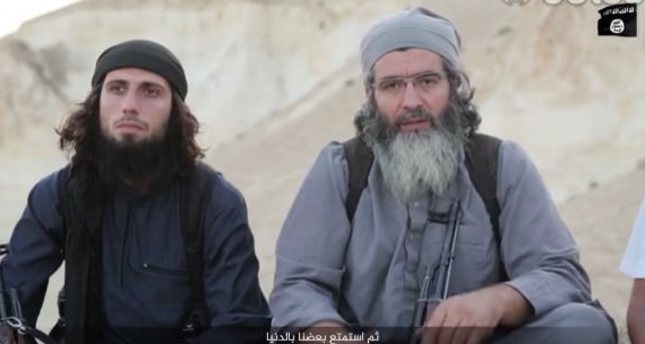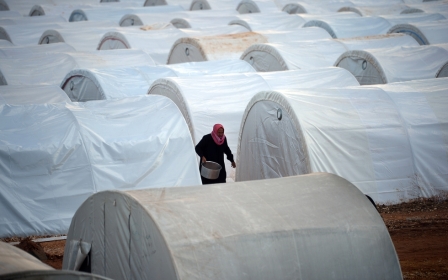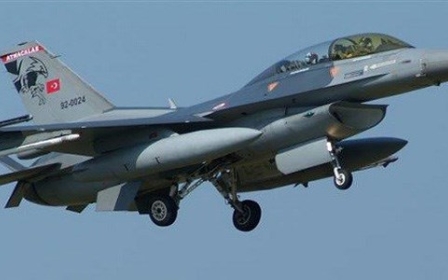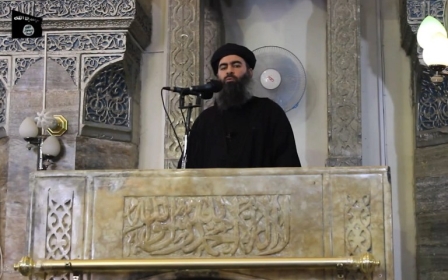Islamic State threatens Turkey, calls Erdogan 'Satan'

In an online video released on Tuesday, the Islamic State (IS) group called on Turks to "conquer Istanbul and Turkey from the ones who cooperate with the West," while referring to President Recep Tayyip Erdogan as "Satan".
The video titled “A message to Turkey” told Turks they must abandon secularism and rise up against “atheists, crusaders and devils who fool them and make them slaves to the crusaders.”
In the video, IS denigrates Erdogan as “treacherous” for allegedly “selling the country to the US and Western powers” and attacks him for supporting the US-led coalition against IS.
Speaking in Turkish, an unidentified IS militant told Turks to revolt against their country and join IS instead.
"You first need to repent from all mistakes – which are caused by this treacherous Satan [Erdogan] and his friends - that unsettle you," said the bearded man.
"Turkish people should refuse to accept democracy, secularism, human laws, and all types of other evils," he added.
The video also made references to the Kurdish Workers’ Party (PKK), its imprisoned leader Abdullah Ocalan and the founder of the modern Turkish state Mustafa Kemal Ataturk – known as the harbinger of a secularist, military government.
"Whoever follows the path of Ataturk and disregards Sharia [law], becomes Satan themselves by befriending the Crusaders, apostates and atheists."
According to Aaron Stein, an associate fellow at the Royal United Security Institute (RUSI) the video represents a shift in IS’s approach toward Turkey.
“The video is a representation of what IS said in Konstantiniyye last month [IS’s Turkish-language magazine].The big takeaway is there has been a shift in IS rhetoric against Turkey, whereas they [IS] were largely ignoring Turkey beforehand,” said Stein.
“Oddly enough [IS] accuses Erdogan and Turkey of being in bed with YPG and now with the Incirlik agreement as stooges of the West or America. [The statement] is threatening Turkey in a way, which before the Konstantiniyye magazine, was not happening,” he added.
Turkish government has recently pushed for a shift in policies towards IS as well. The US and Turkey agreed late last month to formally join the US-led airstrike campaign against IS and carry out a military campaign to create a buffer-zone inside northern Syria.
“We are seeing a real shift in Turkey’s policy domestically and internationally in terms of the way it deals with IS and we are [thefore] seeing IS react,” said Stein.
The video also comes at a critical time in Turkish domestic politics as the country gears up for a snap election after parties have reportedly failed to create a coalition government.
“The video will certainly be picked up by pro-government circles... [and] wrapped into a narrative which they are trying to create that Turkey is fighting a war on terror against PKK and IS,” said Stein.
Nationwide operations
Since 24 July, about 1,600 IS and PKK members have been arrested in a wave of counter-terrorism raids, amid a spike in attacks targeting police and the army after a 20 July suicide bombing in the southeastern Suruç district which killed 32, mostly Kurdish activists.
Police have been carrying out nationwide operations to apprehend suspected PKK, IS, and DHKP-C members - all three of which are designated as “terrorist” organisations by the Turkish government.
Commenting on the video, a senior Turkish official said that the Suruç bombing was not the first incident, and that IS had targeted Turkish officials in the past, citing at 2014 raid on the Turkish consulate in Iraq and kidnapping of 49 Turkish diplomats and nationals.
“They have, likewise, called for ‘the conquest of Constantinople’ in the past,” said the official.
“Although Turkey terror-listed ISIL [IS] back in October 2013, security measures and crackdowns have been kept secret for fear of retaliation.”
“Turkish authorities are working hard to prevent future ISIL attacks and, as a result of the crackdown over the past year, Turkish police officers seized at least 30 suicide vests in safe houses,” added the official, using an alternative acronym for IS.
“The number of deadly attacks that we prevented makes it clear that we can not take a break until we root out terrorism in the region.”
Middle East Eye propose une couverture et une analyse indépendantes et incomparables du Moyen-Orient, de l’Afrique du Nord et d’autres régions du monde. Pour en savoir plus sur la reprise de ce contenu et les frais qui s’appliquent, veuillez remplir ce formulaire [en anglais]. Pour en savoir plus sur MEE, cliquez ici [en anglais].




